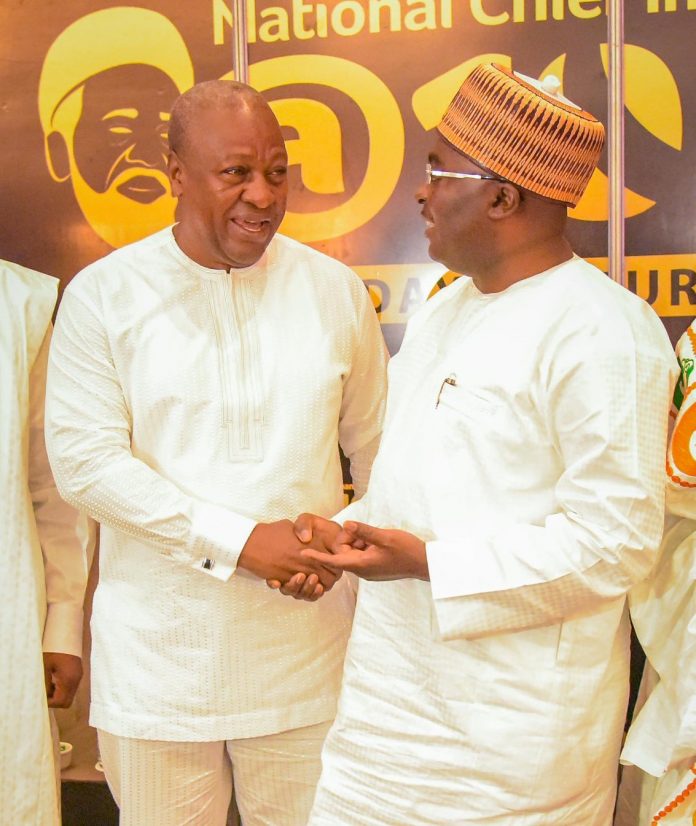|
Getting your Trinity Audio player ready...
|
A High Court Judge, Justice Anna Taylor has urged Ghanaians, especially politicians to accept election results determined at the polling stations, asserting that the courts are not responsible for declaring election winners.
Speaking at the Kofi Annan International Peacekeeping Training Centre’s Stakeholder Dialogue Series in Kumasi Justice Taylor stressed the importance of comprehensive education about the country’s electoral processes.
She however pointed out that while many acknowledge that elections are decided at the polling stations, there is still a tendency to seek judicial intervention to settle disputes.
“If the necessary education has gone on, the parties involved, [they] should also be ready to accept the results because I hear people say over and over again that elections are won at the polling stations. But, of course, they know where the elections are won, at the end of the day, they want to go to the Court for the courts to pronounce who has won. So, we must understand the law, understand how they operate, and I believe if there is a trust system, then everything will go on smoothly”, Justice Taylor said.
She also noted that delays in resolving election disputes are often due to the necessary legal timelines and procedures but assured that the Judicial Service is equipped to handle such matters effectively.
“People may expect that, immediately the petition is filed, within three days, everything must be resolved, it is not possible, because you should remember, there are even timelines. When you should even file your petition, the law has spelled it. Then when it is filed, the other party must respond. It all comes within time frames that have been set…but of course, the courts can manage its time, and allot more time to matters that are pending and give some priority to the election petition.”
“The Judicial Service is ready, and the forums for resolving disputes are already available and when you look at the law, at times, it’s as if we, we are looking forward to having disputes and the law itself is ready to accommodate disputes”, the High Court Judge remarked.
Other speakers
A programme executive at Research Governance of Human Rights for the African Union Justice Oman expressed concern about the growing disconnect between African governance systems and the expectations of the citizens.
He said recent happenings in Kenya and various parts of the continent over the past few years serve as a critical signal for necessary reforms.
The AU official called for improved governance and democratic practices across Africa, particularly in light of growing political unrest.
“Over the past few years, we have experienced political instability across the continent. Recent events in Kenya call for a deeper reflection on the nature of democracy and the quality of governance on the continent. It is time to reflect on and identify the disconnect between the governance system in Africa and the expectations of the citizenry to address it,” Oman stated.
He emphasized that “this is the time for African citizens to engage constructively in the governance process to build strong, resilient institutions.” These institutions, he stressed, should promote trust, uphold the rule of law, entrench democratic values, and protect the fundamental human rights of every African citizen.
The dialogue series initiated in 2021 and spearheaded by the KAIPTC, is to engage its stakeholders, development partners, and institutional partners on specific issues of concern within the peace and security architecture of the country.
The Deputy Commandant at the KAIPTC, Air Commodore David Anetey Akrong stressed the critical need for robust institutions and civic engagement to ensure sustainable development and security in Africa.
“The relationship between a country’s security situation and its institutions is intricate and multifaceted. Strong and effective institutions are essential for ensuring national security, upholding the rule of law, promoting accountability, resolving conflicts, and supporting economic development. By investing in resilient institutions and promoting good governance, countries can enhance their security architecture and contribute to sustainable peace and development”, he noted.
Reflecting on Ghana’s upcoming polls in December, Akrong emphasized the crucial importance of civic engagement and robust institutions for the nation’s long-term development.
“Africa has a busy election calendar in 2024, with an estimated 17-19 countries slated for presidential or general elections…As Ghana goes to the polls in December this year, we must reflect on the pivotal role that civic engagement and strong institutions play in the sustainable development of our nation.
“Every voice matter, and every individual has a role to play in shaping our collective future,” he asserted.
The stakeholder dialogue series focused on “Enhancing Civic Engagement and Institution-building for Sustainable Africa.” It brought together participants including selected journalists, judges, representatives from state security agencies, the Electoral Commission, NCCE, CHRAJ, and civil society.
The event was in partnership with the All-Africa Conference of Churches and supported by the Governments of Norway and Germany as well as Bread for the World.
SOURCE: DAILY MAIL GH





